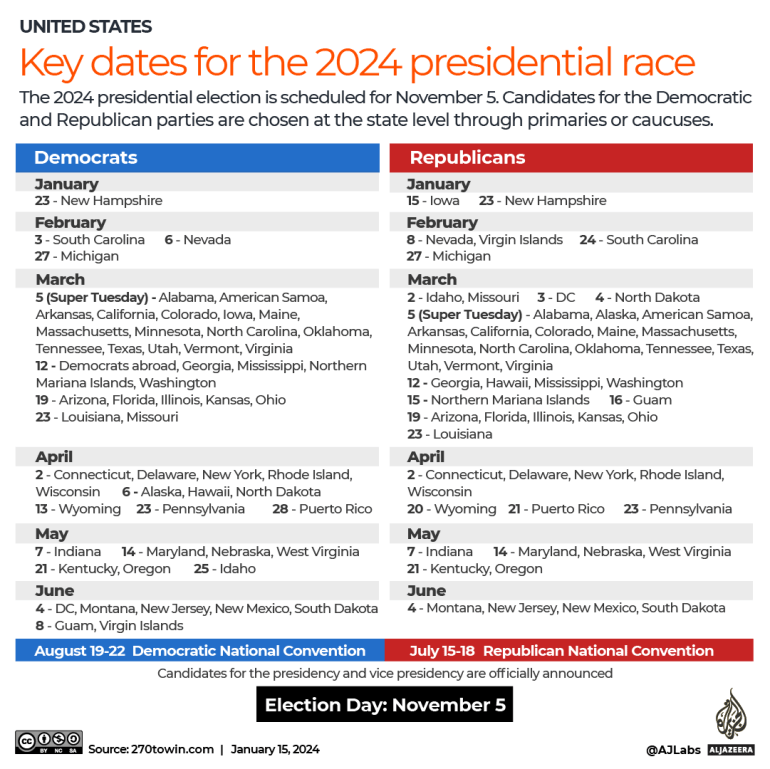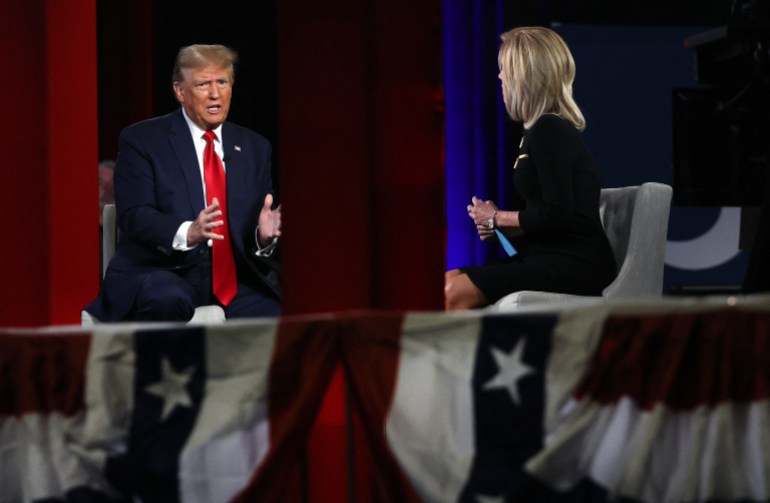ARTICLE AD
Former South Carolina Governor Nikki Haley and former United States President Donald Trump are facing each other in Saturday’s South Carolina primary in the race for the 2024 Republican Party’s presidential nomination.
Staunchly pro-Israel, Haley served as US ambassador to the United Nations under Trump, during which time she blocked the appointment of former Palestinian Prime Minister Salam Fayyad as the global body’s envoy to Libya. Despite taking a “consensus” approach to the issue of abortion in a bid to present herself as more “reasonable” to US voters than many of her conservative colleagues, critics said Haley is firmly anti-abortion rights.
Recently, she stated that she believes frozen embryos are children, a move taken as an endorsement of the Alabama Supreme Court’s ruling to that effect this week. That ruling has potential implications for fertility rights and abortion in the US and has sparked criticism from women’s rights groups.
South Carolina is a particularly crucial primary for Haley, so what’s in store?
Why is this primary so important for Haley?
South Carolina is Haley’s home state. She was its governor for six years until 2017. A loss to Trump, who leads her in opinion polls by 36 points, would come as a major political blow. Regardless, Haley has promised to fight on even if she does lose in the state.
On Tuesday, she said she has “no need to kiss the ring” by bowing out and endorsing the former president.
In South Carolina, Haley’s governorship was viewed favourably among her core constituents. However, women have made up an average of 53 percent of the voters in presidential elections since 2000, and this could, ironically, be to her disadvantage. In December, an Emerson College poll showed just 8 percent support among Republican women for Haley compared with 19 percent support among Republican men.
 (Al Jazeera)
(Al Jazeera)
How is a presidential candidate selected?
South Carolina operates under an open primary system, which permits any registered voter to participate in the party’s primary. However, voters can take part in only one party’s presidential primary. Those who cast their votes in South Carolina’s Democratic primary on February 3 are ineligible to participate in the Republican contest.
South Carolina’s Republican primary is being held on Saturday with polls closing statewide at 7pm (00:00 GMT).
The state contests from January to June choose delegates, the people who will ultimately cast votes at the party conventions in the summer to decide their party’s presidential candidate. South Carolina has 50 Republican delegates and will award the votes of 29 of them to the candidate who wins this primary. It will also award three to the winner in each of the state’s seven congressional districts.
A minimum of 1,215 delegates are needed nationwide to secure the Republican presidential nomination – more than half the 2,429 available.
After three state contests so far, Haley has 17 delegates to Trump’s 63.
South Carolina’s delegates are a sliver of the total number, but wins in early primaries and caucuses have historically created momentum leading up to Super Tuesday, the day when most of the states vote. This year, Super Tuesday is on March 5, and 16 states will choose about one-third of all delegates. They include California (169 delegates) and Texas (161).
 Former US President Donald Trump participates in a Fox News town hall with host Laura Ingraham at the Greenville Convention Center on February 20, 2024, in Greenville, South Carolina [Justin Sullivan/Getty Images/AFP]
Former US President Donald Trump participates in a Fox News town hall with host Laura Ingraham at the Greenville Convention Center on February 20, 2024, in Greenville, South Carolina [Justin Sullivan/Getty Images/AFP]
Is Trump likely to win South Carolina?
Trump is a formidable presidential candidate this year, having already swept up Iowa, New Hampshire and Nevada. Opinion polls show he has a substantial lead over Haley.
With high-profile Republican endorsements from Governor Henry McMaster and US Senator Tim Scott, Trump remains a star for the party.
So far this year, Trump has backing from seven governors, 18 senators and more than 90 members of the House of Representatives. This includes House Speaker Mike Johnson.
Despite being dogged by criminal cases and lawsuits – including a civil fraud case in which Trump was ordered on February 16 to pay more than $350m in damages – his popularity among his core base has not waned. Indeed, many see him as the victim of a witch-hunt and are even more determined to support him.
With several other cases against him still pending across several jurisdictions, however, Trump’s path to the presidential nomination remains uncertain.
Trump has denied any wrongdoing in all of the cases.
Is Haley finished if she loses this primary?
Losing South Carolina could spell the start of the end of Nikki Haley’s presidential campaign bid. Political analysts said a loss in such early primaries dampens chances to build momentum and win voters, not to mention donors.
However, during a campaign speech on Tuesday in Greenville, South Carolina, she defiantly said: “South Carolina will vote on Saturday, but on Sunday, I’ll still be running for president.”
There was a glimmer of hope for her campaign during the New Hampshire primary, held on January 23. Haley placed second in that race with 43.2 percent of the vote, compared with Trump’s 54.3 percent – much less of a landslide for Trump than he has achieved in other states.
In some hypothetical head-to-head polls of registered voters of all political persuasions, however, Haley performs better against US President Joe Biden than Trump does.
According to the latest Quinnipiac poll, in a hypothetical 2024 presidential election scenario, Biden, a Democrat, would maintain a narrow lead over Trump, garnering 49 percent of registered voters compared with Trump’s 45 percent. In a Haley-Biden run-off, however, 47 percent of voters said they would support Haley compared with 42 percent for Biden.
If Trump does win Saturday’s primary, however, Republican leaders may be forced to throw their weight behind him.

 10 months ago
65
10 months ago
65 